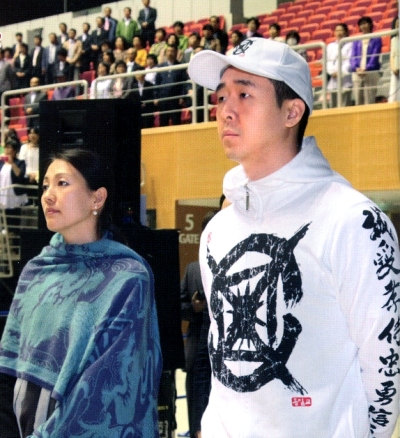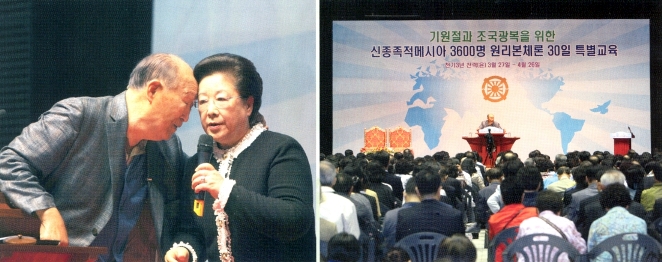![]()
The Words of Hyung Jin Moon From 2012
|
|
The Words of Hyung Jin Moon From 2012 |

We have been wrestling through Christological issues. What kind of being is Christ? Also, what kind of beings are the first, second and third Adams -- Adam, Jesus and True Parents? What you might call Adamology! How was God, or how is God, using them differently than He does you or I?
And if I am praying and I do conditions and receive some kind of revelation from
God that guides me in a certain direction or to take on a new mission (whatever I've been praying about) and I get a real confirmation and I feel God is guiding me, what is the nature of that communication? Is that God Himself? That's a very important question.
Historical, Christian Trinitarian formulations rely on ontological' categories borrowed from Greek philosophy and use such terms as "essencia" [essence] or "substantia" [substance]. They say that from the essence of God-the-Father proceeds the Son, and that because he proceeds from the essence and he is of the same essence -- of the same substance -- that the Father and the Son are actually the same. They are identical in terms of their being the same substance and essence.
However, unintended theological problems arise from this union of Biblical faith and experience and Greek philosophy. These issues include ditheism, or tritheism. Christianity has been accused of believing in two Gods and then adding the Holy Spirit to that.
Most contemporary critical theologians have recognized the problem of using words such as "essence" and "substance," because as conceptual metaphors, they are inadequate to explain the nature of God and may even further conceal God's real nature. Put in other words, a substantialist or essentialist ontology does not best accommodate the doctrine of the Trinity -- the affirmation that God is both three and one; that is, the three persons of the Father, Son and Holy Spirit of the one God.
I concentrated my studies in this area near the end of my time at Harvard. I was interested to compare with Hwa-yen Buddhism, which had a particular trinitarian formulation, with two bodhisattvas -- the bodhisattva manjushri and the bodhisattva samantabhadra -- with Vairocana Buddha. They articulated a notion of mutual interpenetration and non-obstruction [of the three Buddhist entities] that closely matched John of Damascus notion of the perichoresis, the dancing of the three persons within the Christian Trinity.
In the end, many Trinitarian theologians say, "It's a mystery. We are not able to fully understand the Trinity," which is one reason that the Lord returns. He clarifies what Jesus Christ could not reveal in his time on earth because of the hardness of heart and perhaps thickness of mind of his audience.

On
May 18, True Father stood at the podium and spoke for more than five
hours without respite at the Cheongshim Peace World Center to members
beginning the 30-day OSDP workshop.
The Principle ontology is relational. Nothing can exist without relationship. Even in God, there are dual characteristics. Love itself cannot exist outside of a relationship. We know love is the essence of God, so thus God cannot "exist" without relationship. (He has His internal relationship of dual characteristics, of course.)
What we have is a critique of traditional ontology, and a new relational ontology. On top of that, we have a new type of anthropology that explains what a human person is.
One's anthropology has implications for many theological and practical issues. In Christianity, you have the soul and the body. Some Christians take the scriptures to be saying that when Christ returns, the bodies of the deceased will be resurrected from the grave, the Rapture. They actually believe that the bodies of the dead will be reconstituted.
In Unification anthropology, a human being is composed of four parts, not two. A person has a spiritual self and a physical self. The spiritual self is comprised of a mind and body, and the physical self is comprised of a mind and body. When the Lord returns, the deceased can be resurrected with their spiritual body. That "body" would be resurrected and have relationships with the saints on earth who are attending Christ during his Second Advent. So our unique anthropology of a four dimensional human being allows for a new perspective on both physical and spiritual experience.
To return to the Christological question, we can best understand Father's uniqueness through his unique relationship to God If that's tho cast' we don't run into "essence" and "substance" issues. We are saying that True Father is relating to God directly. What we mean by directly is this:
God is a transcendent mind. He doesn't have a spirit body. Father has the four parts of the anthropology of a human being -- spirit mind, spirit body, physical mind and physical body. We are saying that Father's spirit mind is infused with God's spirit mind. Hence, God is one with Father's spirit mind, which is in an inseparable relationship with Father's spirit body. Thus, God can use Father's spirit body. That's why, when you see God in the spirit world you'll see True Parents. God is not Himself visible. He has no form. He is intangible. Father's spirit self (his spirit mind and spirit body) is in an inseparable relationship with Father's physical self. Through this mind–body relationship, God can experience the world through True Father's spiritual and physical selves.
How would that then relate to us? If I am praying to God, can't I speak to God? Can't God speak to me? Doesn't He answer my prayers?
In the spirit world, I can see your spirit body but not your spirit mind, just as in the physical world, I cannot see your physical mind. Yet, God is only spirit mind. True Father is infused with God; God is in his spirit mind. Because Father's spirit mind is inseparable from his spirit body, God is one with Father's spirit body. Because God is present in Father's spirit mind, in the spirit world, through Father's spiritual body, we can actually see God. Because True Father's spirit self is completely one with his physical self, when we see Father on earth we are actually seeing God. Christ is a unique mediator. He is unique because God so chooses. He chose Adam. When the time came, He chose to use Jesus, but Jesus' earthly life was cut short. Then God chose to use Father as the Lord at the Second Advent, and Father succeeded in completing the mission of the Christ.
Through the union of True Mother with True Father, God can experience True Mother's physical self (through True Father's physical self) and He can experience True Mother's spirit body and spirit mind. Father and Mother become assumed into God. So when we see True Parents, we see God.
Now, when I get a message from God, or I feel God is pushing me in some direction, what is that? It's just as it is in the spirit world; it's a voice or influence coming through True Father or True Mother's spiritual body. Is it God Himself? Yes and no. It's not that God is in your spirit mind so that you are equal to the Messiah, to Christ, because God did not choose you as Christ. God chose True Parents as Christ. So, He is infused in their spirit minds, and uses their spirit bodies in an inseparable relationship. When you are internally pushed by something in the physical world, you may be interacting with their spirit bodies.
We might say, I can become a true parent. However, that is only possible, from a Principled perspective because we can come into a full relationship with God because of our relationship with True Parents. Because God chose Father as Christ, Father has the unique role of the mediator.
Of course, God is fully there when we are interacting with Father's spirit body, because Father is in an inseparable relationship with God's spirit and mind. It's Principled. We unlock the mystery of the Trinity through Unification relational ontology. The Trinity can be understood with relational ontology. We are not talking about three different Gods.
I want to keep wrestling with this theology, because this is something we are just coming upon. I don't want to mass produce it and publicize it all over the world, but these are some of the things we are wrestling through. While I'm serving Father, I have to continue to think theologically so that we can understand Christ's value, the value of Christ at his Second Advent.
With this understanding, we can understand why True Parents are absolutely essential. They play the mediator role between humankind and God. Also by understanding our relational ontology, we can also understand the Christology of Christ from a Divine Principle perspective, the nature of this Trinity.
True Father would be the first-ever to be infused with God's spirit because he fulfilled the original three blessings offered to Adam and completed Jesus' mission. The Principle does say that God will dwell within our spiritual and physical selves, that He wants to experience the husband–wife relationship (absolute sex). That's true. But Father is the chosen one. Without True Parents, you could never be in a relationship as a blessed couple. Without that central relationship between True Parents and God, we wouldn't have the way to get to God. True Parents play that unique mediator role.
Father has said that when we meet God in the spirit world -- when God appears -- He will appear in the persons of True Parents. That evidently says that True Parents' spirit bodies are the way in which beings in the spirit world will experience God. So God would not infuse our spirit mind in the same way that God infuses True Father's spirit mind.
Relatedness is everything. Love itself cannot exist without a relationship. Father says, "God wouldn't be anything without me!" We can understand how that is true if we look at existence in terms of our relational ontology. When Father says "God is nothing without me," it is true that without an object partner, God cannot love and thus cannot be a God of love. Because love can only exist within relationships, God can only truly be God through True Parents' victory